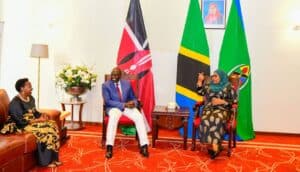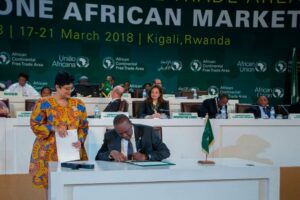
The AfCFTA Investment Protocol is a Timely Answer to Sour Kenya-Tanzania Trade and Integration Relations
Not-so-neighborly Relations
A recent article expressed fears over the continued sabotage of economic activity between Kenya and Tanzania, East African Communities’ two major states as a pretext for a blurred future in the region’s trade and economic integration. Rightly so, the two nations have endured long periods of trade wars and non-tariff barriers going as far as 1977 when Tanzania first closed its borders to Kenya, the burning of 6,400 chicks from Kenya bound for Tanzania, and confiscation of 4,000 heads of cattle from Tanzania seized in Kenya. So common are the squabbles and mistrust that they have been cited as a leading impediment to free trade gains and enhanced regional integration within the East African Community.
The African Continental Free Trade Area Agreement (AfCFTA) comes at a time when the two neighbors need lasting solutions in conflict resolutions to trade conflicts that have lasted for decades. The AfCFTA, established to facilitate the elimination of barriers to the trade of goods and services across the continent and enhance successive liberalization of trade in services, offers an investment protocol that provides for foreign direct investment and conflict resolution mechanisms. If ratified, therefore, the investment protocol provides a much-needed mechanism for streamlining relationships between the nations and driving increased investment and seamless trade exchanges.
Investment Protection
The AfCFTA investment protocol provides for investor protection mechanisms by defining the rights and obligations of both the member states and investors. While the protocol is unlikely to apply on lawful taxation measures and property acquired for non-business purpose, it provides mechanism for the protection of sustainable investments between the two nations, efficient dispute resolution and the balancing of state and investor interests. By compelling the East African Community to align regional instruments with the protocol, Article 49 will eliminate bilateral investment instruments and provide mechanisms for investor protection in either of the nations.
Notably, Article 5 of the protocol requires that investments made between nations are owned or controlled, directly or indirectly, by persons of state parties to the AfCFTA. The ratification and depositing of trade institutions with the trade agreement by Kenya and Tanzania lays the ground for the protection of investors in either country by the nations. The nations will thus be compelled to avoid barbaric measures, such as confiscation of cattle and burning of life chicks, facilitating collaboration and coordination it trades and social aspects of the two countries.
The investment protocol further provides that investors maintain substantial business activity in the host nation, and for the investments to involve the commitment of capital, expectation of profit, a defined duration of operation, and assumption of risks and contribution of sustainable development to the host nation.

Illicit trade has been a major cause of mistrust and non-tariff barrier escalation between the two nations impacting cross-border trade and regional integration negatively. The protocol thus provides clear definitions of investments and trade activity across the border and is a needed element in preventing the seizure of property and goods illegally straining relations between the two states. The provision for investors who can be denied the protection of the protocol as per Article 5 is therefore a welcome element toward ending bad blood in trade between Kenya and Tanzania.
Dispute Settlement
Article 20 of the investment protocol provides a mechanism for the settlement of arising disputes in inter-state relations. The trade and diplomatic relationships between Kenya and Tanzania have been characterized by a varying range of disputes pitting state agencies, investors, and individual citizens. Thus, disputes can be expected between the two nations as signatories to the AfCFTA and EAC or through issues between investors and the host nation. The protocol is equipped with a dedicated rules and procedures annex with an established panel, working procedures of the panel, expert review mechanisms, and a code of conduct for arbitrators and panelists. This will establish a common voice of investor protection and dispute resolution mechanism between the two nations leading to faster resolutions and enhancing trade continuity.
“This is a compelling argument for Kenya and Tanzania to limit unethical seizures and handling of confiscated goods and subject disputes to the stipulated and lawful trade mechanisms.”
Under the mechanism, it is incumbent on the two nations and the EAC to negotiate on appropriate measures, such as through the East African Court of Justice, to establish effective investor-state dispute settlement mechanisms currently not provided for in the investment protocol. This can be instrumental in dealing with exorbitant costs of arbitration proceedings, arbitrary awards, legitimacy, time, and transparency concerns that have characterized nation-to-nation litigations in the past.
Consequently, Kenya and Tanzania can be expected to increasingly treat investors in a manner not less favorable than investors of the host state and other member states as outlined in Articles 12 and 14 of the protocol, which is a missing link in the current cross-border relationship. Moreover, a better treatment of disputes and investors, by not being subjected to arbitrary treatment in administrative matters and judicial proceedings, is expected among the East African giants.
Investment Facilitation
Traditional trade agreements are based on the need to ensure investment facilitation by providing a transparent, efficient, and investment-friendly environment for investors to easily conduct day-to-day business, expand operations, and invest. While the protocol is open to Kenya and Tanzania adopting self-selection of commitments for special and differential treatment for investment facilitation, it accounts for the reduction of barriers in time, cost, transparency, efficiency, and coordination. The adoption of centralized focal trade points is nevertheless a suitable consideration for the two nations to consider under the protocol.
Notably, Article 18 of the protocol calls for the need for individual host nations to provide physical protection of investments by foreigners within their jurisdiction. This is a compelling argument for Kenya and Tanzania to limit unethical seizures and handling of confiscated goods and subject disputes to the stipulated and lawful trade mechanisms. This is by Article 19 of the protocol that seeks to protect foreign investments and assets from being unlawfully seized by the host state as it commonly occurs within borders between Kenya and Tanzania.
Investor Obligations
Investors are often to blame in cases of sustained misconduct in cross-border trade between the two nations. Smuggling has often characterized trade and bad blood between the two nations with occasional cases that lead to loss of revenue warranting unorthodox measures by border officials. Thus, the investment protocol guides investors on the need to comply with national and international laws among other business ethics, human, and labor rights to reduce disputes and ensure continued harmonious trade relations.
Article 34 of the protocol compels investors to respect and protect the environment to be considered in trade concessions while calling for the protection of the rights of indigenous people and communities. Notably, foreign investors are also guided by the mechanism to refrain from interfering with the internal affairs of the host state, avoid corrupt practices, and contribute to sustainable development.



